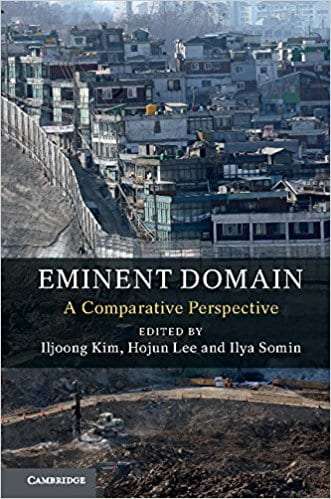The Volokh Conspiracy
Mostly law professors | Sometimes contrarian | Often libertarian | Always independent
"Big data" and takings compensation in Taiwan

My chapter "Eminent Domain Law in Taiwan: New Law, Old Practice?" in Eminent Domain: A Comparative Perspective serves as an interesting counterpart to the six chapters on eminent domain law in South Korea. In fact, the development of eminent domain law in Taiwan and South Korea are strikingly similar. Two recently democratized countries, with democratic legitimacy behind the government and the strong desire to continue its economic growth, often limited (if not sacrificed) property rights, sometimes drawing on the "social obligations" of property owners.
This is even more interesting if one looks at the 800-pound gorilla in the region - China. I have conducted some field research in China and talked with a lot of Chinese scholars regarding eminent domain issues. It seems that, at least in some regions, property rights have been immensely respected. Government officials will sweet-talk the owners again and again (unlike in South Korea and Taiwan, where government officials will bargain once and, if unsuccessful, use the eminent domain power). The worst case scenario for those Chinese property owners is being "the coolest nail house." Ironically, "Social obligation" takes a back seat in a socialist country. On explanation is that without democratic legitimacy, the Chinese Communist Party needs to act as if it is better than a ruling party in a democratic country (another example is that farmers in China do not have to pay "agricultural taxes"). Therefore, the eminent domain power is used with a lot of restraint.
One thing that, in my view, Taiwan policymakers did better than their Korean counterparts is to start using "big data" in the takings procedure. In 2012, about the same time that the legislature amended the relevant statute to mandate fair market value compensation for condemned property, another set of statutes were revised to require real estate owners and brokers to report the authentic transaction values to a central government repository in the government. The Taiwan Ministry of the Interior Affairs not only built a website with graphical interface to enable anyone to see the data visually, but also periodically release the data in Excel format, for free. To date, millions of sales, including information on sale prices and hedonic characteristics, are available. I have used this data set in multiple research projects and have avidly advocated using this data set and hedonic regression models to estimated fair market value for takings purposes.
Appraising property value for takings purposes is a big issue in the practice of eminent domain, as many people still consider appraisals as more art than science, which is no longer true. In my prior empirical research on takings compensation in New York City (Yun-chien Chang, 2010, "An Empirical Study of Compensation Paid in Eminent Domain Settlements: New York City 1990 - 2002", Journal of Legal Studies, 39(1), 201-244; Yun-chien Chang, 2011, "An Empirical Study of Court-Adjudicated Takings Compensation in New York City: 1990 - 2003", Journal of Empirical Legal Studies, 8(2), 384-412.), I have found that property value assessment there is very whacky.
My empirical studies of the past practice in Taiwan showed systematic under-compensation (Yun-chien Chang, 2009, "Empire Building and Fiscal Illusion? An Empirical Study of Government Official Behaviors in Takings", Journal of Empirical Legal Studies, 6(3), 541-584; Yun-chien Chang, 2012, "Self-Assessment of Takings Compensation: An Empirical Study", Journal of Law Economics & Organization, 28(2), 265-285). In short, there are many reasons to believe that regression models and big data can do a better job in assessing real estate values than error- and bias-prone human appraisers, even experienced ones. Condemnors in Taiwan have not yet embraced my policy proposal yet. But the Taiwan Ministry of the Interior Affairs has started to use the aforementioned data set to compute a real estate value index that is used to adjust the assessed, compensable market value if the eminent domain process drags too long. This is one step in the right direction. I hope to be able to report better news soon.
If you are interested in more of my takings work, please take a look at my book Private Property and Takings Compensation: Theoretical Framework and Empirical Analysis.


Show Comments (0)